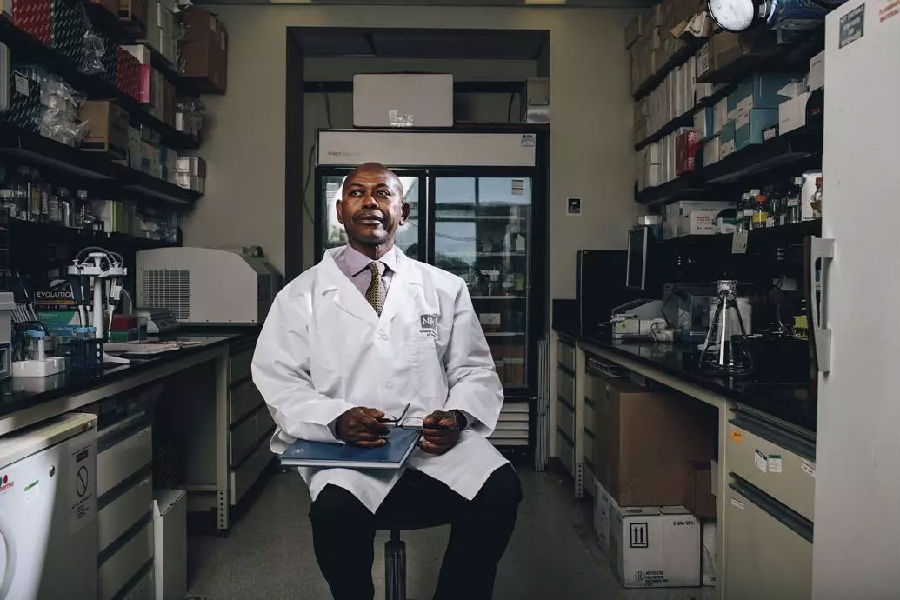封面文章
Cancer Scientists Have Ignored African DNA in the Search for Cures
癌癥科學家在尋找治療方法時忽略了非洲的DNA
BY JESSICA WAPNER
作者:杰西卡·韋普納
Charles Rotimi first realized the future was passing him by around 2005.
查爾斯·羅蒂米在2005年左右第一次意識到未來正在離他而去。
The Human Genome Project had recently finished spelling out an entire set of human DNA.
人類基因組計劃最近完成了一套完整的人類DNA的復寫。
Following that breakthrough, scientists in six countries across the globe had begun collecting blood samples to find genes responsible for various conditions, including serious diseases, which could lead to treatments.
在這一突破之后,全球6個國家的科學家開始收集血液樣本,以尋找治療各種疾病的基因,包括用于治療嚴重疾病的基因。
And Rotimi, who was leading that collection effort in Africa, had the sick feeling that history was repeating itself.
而在非洲領導負責這項工作的羅蒂米,深憂于歷史正在重演。
He wasn't concerned about himself so much as his homeland.
與其說他關心他自己,不如說他關心他的祖國。
In the past, African patients have had poor access to medical advances, even as scientists use them as research subjects.
過去,即使科學家將非洲患者作為研究對象,他們也很難獲得醫療進步。
Rotimi worried that genetics might again exploit the 1 billion people sub-Saharan Africa, ignoring their need for treatments for HIV, tuberculosis, malaria and cancer.
羅蒂米擔心遺傳學可能再次利用撒哈拉以南非洲的10億人口,而忽略了他們對艾滋病、結核病、瘧疾和癌癥治療的需求。
"The genomic revolution was going to fly over Africa," he says, "and tomorrow’s medicine will not work for all."
“基因組上空展開,”他說,“未來的藥不會對所有人都有效。”
His concern was well founded.
他的擔憂并不是空穴來風。
Over the next few years, scientists came out with a frenzy of discoveries about our DNA that could possibly lead to new treatments for diabetes, cancer, psychiatric illnesses and other serious diseases.
在接下來的幾年里,科學家們對我們的DNA進行了大量的研究,這些發現可能會為糖尿病、癌癥、精神疾病和其他嚴重疾病的治療提供新的方法。
But they were drawing from a small slice of the world: Nearly all of the published work was based on populations with European ancestry.
但他們的研究來自世界的一小部分:幾乎所有出版的作品都是基于歐洲血統的人群。
By 2009, fewer than 1 percent of the several hundred genome investigations included Africans.
截止到2009年,在幾百個基因組調查中,只有不到1%的調查包括非洲人。
The genomics revolution soon began to sputter.
基因組革命很快就開始了。

Being able to know the exact genetic makeup of each patient was to bring a new era of treatments tailored for each individual.
了解每位患者確切的基因組成,將會帶來一個新時代:為每位患者量身訂造治療方案。
But doing so depends on finding minute variations in our DNA that correlate with the occurrence of disease or bad drug reactions.
但是否能做到這一點,取決于我們DNA中與疾病或不良藥物反應相關的細微變化。
This task requires the full range of genetic variation among as many humans as possible.
這項任務需要盡可能多的人類中的完整基因變異。
Otherwise, genomics research is like a search party that circles the same few trees looking for signs of the killer rather than spreading out through the entire woods.
否則,基因組學研究就像一個搜索小組,在相同的幾棵樹周圍搜尋兇手的蹤跡,而不是在整個樹林中展開。
The richness of African genomes is a product of the evolution of our species.
非洲基因組的豐富是我們物種進化的結果。
Modern Homo sapiens originated in Africa about 200,000 years ago.
約20萬年前,現代智人起源于非洲。
About 100,000 years later, 1,600 or so men and women—from a population of at least 20,000 and likely much more—left the continent and spread around the globe, eventually reaching Europe and, more recently, the Americas.
約10萬年前,從至少有2萬或是更多的人口,只剩下共約1600名男性和女性,離開歐洲大陸,傳播到世界各地,最終到達歐洲,再后來到達美洲。
"In other words," wrote University of Washington geneticist Mary-Claire King and colleagues in a 2017 commentary, "about 99 percent of our evolutionary experience as a species was spent in Africa."
“換句話說,”華盛頓大學遺傳學家瑪麗-克萊爾·金及其同事在2017年發表的一篇評論文章中寫道,“我們99%的進化經驗都是在非洲物種進化的結果。”
Whatever genetic diversity existed across the continent until then was almost entirely left behind when that small group emigrated—and it is there still, hidden in the genes of each African.
在此之前,無論整個非洲大陸存在何種遺傳多樣性,當這個小群體移民時,幾乎都被完全拋在了身后——但這種物種多樣性仍然存在,隱藏在每個非洲人的基因中。
That is partly why Rotimi was so dismayed by the exclusion of Africa from genomics.
這就是為什么羅蒂米對非洲被排除在基因組學之外感到如此沮喪的部分原因。
"We are all Africans beneath our skin," he says.
“在皮膚下,我們都是非洲人,”他說。
More and more scientists are coming around to Rotimi's view—
越來越多的科學家開始接受羅蒂米的觀點——
that Africa contains one of the greatest weapons in the quest to combat cancer: the DNA of its people.
在與癌癥作斗爭的過程中,非洲擁有最偉大的武器之一:人類的DNA。
譯文由可可原創,僅供學習交流使用,未經許可請勿轉載。


